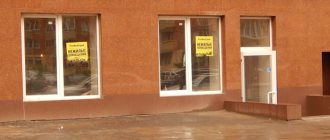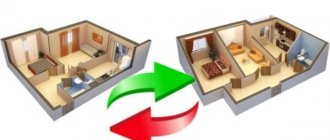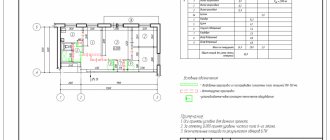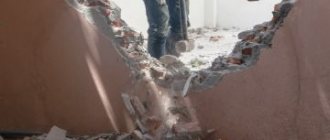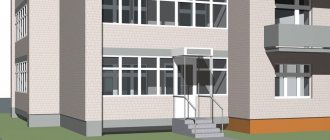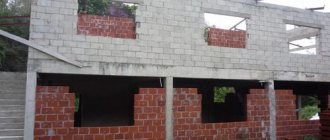What it is?
Features of the redevelopment are reflected in Chapter. 4 LCD RF. According to the code, redevelopment is considered to be any work to adjust the structure of a non-residential property, its area and size.
Redevelopment can include:
changing the size of windows and doorways in the room (reducing or enlarging, changing shape) or sealing them;- eliminating small rooms by combining them into a spacious room;
- adjusting the size of small rooms within the facility.
The main goal of the redevelopment is to change the internal content of the premises so that its qualities are significantly improved and are suitable for subsequent commercial or other activities. It is important to consider that the new premises must not only meet the functional requirements of the company, but also not contradict the legislation of the Russian Federation.
ATTENTION : The main principle of redevelopment is change within the premises. Changing the appearance of a building is not considered redevelopment.
When carrying out work, load-bearing walls cannot be used . In addition, after the changes have been made, the layout of the general communications of the premises should not change.
What's the difference with rebuilding?
Art. talks about the reconstruction of non-residential objects. 25 Housing Code of the Russian Federation.
The article says that the following types of work include reconstruction :
Adjustment of communication networks - their replacement, transfer or installation.- Installation of water drainage, sewerage, heating systems, electrical equipment.
- Installation of toilets, baths, kitchens.
The main difference from redevelopment is that redevelopment is aimed at replacing or adjusting engineering and technical systems - something that is not visible at first glance. Redevelopment is still based on changing the appearance of the room and its overall structure.
Legislation, the role of the Town Planning Code
The basic law that regulates the process of remodeling non-residential premises is Housing Code Art. 26. In addition, the specifics of the work are regulated by the laws of regional authorities.
Among other government documents:
- Town Planning Code of the Russian Federation. His Art. 1 it shows the differences between redevelopment and other types of work in construction.
- Temporary regulations for the approval of design documentation for redevelopment.
- The Code of Administrative Offenses, which determines the amount of fines for violating the rules for approval and carrying out redevelopments.
- Code of Administrative Procedure. He talks about the procedure for legalizing redevelopments.
When should it be done?
Redevelopment of a commercial premises can be justified by many factors, the main ones being :
- Expansion of the company's staff, which requires additional work space or delimitation of areas.
- Reorganization of the enterprise, changing the goals of production activities.
- The need to create convenience and optimize the workflow.
As for documentation, it does not differ depending on the functional purpose of the premises, be it a warehouse, retail space or office.
In what cases is a permit required and is it required in an apartment building?
Redevelopment is a complex, time-consuming process, so it is important to ensure the legality of the procedure at the initial stage. Otherwise, the entrepreneur cannot avoid litigation, which will require the premises to be returned to their original condition. It is necessary to know which types of redevelopment require confirmation of legality. This list includes :
actions performed in relation to the load-bearing floors of the room, creating additional load on the walls - replacing the flooring or screeding it;- creating a new entrance to the premises or correcting an existing one;
- installation of internal stairs, additional upper floors, attics;
- carrying out work on redevelopment of attic spaces;
- transfer, installation or dismantling of loggias, balconies, window openings;
- dismantling or moving plumbing (or special) equipment.
The legislation provides only for the main factors that require approval from the BTI. But you need to keep in mind that for any structural changes in a non-residential premises it is better to consult a specialist. This is especially true if you plan to work in an apartment building.
Unauthorized conduct without the consent of the BTI and responsibility for it
IMPORTANT : Legal redevelopment is accompanied by a permit issued by territorial authorities. Work that is not coordinated with them is assigned the term “unauthorized redevelopment.”
Housing department employees are loyal to isolated objects , so it is mainly used in relation to premises located in a residential building.
The basis for issuing a permit for redevelopment is the approval of the project, which specifies the technical features and sanitary standards corresponding to the facility. If they do not contradict the law, the project is approved. Since compliance with these standards is very important, because it brings safety not only to the owner of the premises, but also to his neighbors, failure to comply with them is punishable.
Illegal redevelopment of premises is recognized as an administrative offense and is subject to a fine in accordance with paragraph 2 of Article 7.21 of the Code of Administrative Offenses of the Russian Federation.
The owner must pay the compensation. The amount of the fine depends on what status it is in :
- an individual pays up to 2,500 rubles;
- legal entity – from 350 thousand rubles. up to 1 million rubles
In addition, the owner is obliged to return the premises to its former form at his own expense. If the person refuses this, the court may decide to sell the premises. The amount received from the sale is given to the owner minus the funds spent on the execution of the court decision. Now the new owner will be obliged to return the premises to the condition before the redevelopment.
In particularly difficult situations, criminal liability may be imposed - for example, in cases where illegal redevelopment endangered human health and life. Then the court decides what punishment the owner deserves.
Watch a video about fines for illegal redevelopment:
Our services
Our company employs specialists with experience in legitimizing even the most complex redevelopments. We will help:
- appeal a fine for illegal planning;
- quickly prepare documents for applying to the Ministry of Housing and the Court;
- register with Rosreestr and receive an extract from the Unified State Register of Real Estate;
- make changes to the technical passport of the BTI, as this is required by the Housing Code of the Russian Federation.
To agree on the timing and cost of services or document execution, contact our consultants and describe the situation in detail.
| No. | Service, document | Price |
| 1 | Redevelopment design | from 12,000 rub. (depends on the area and features of the object, type of work |
| 2 | Support for redevelopment approvals | from 10,000 rub. |
| 3 | Preparation of a technical plan | from 8000 rub. |
| 4 | Support of the cadastral registration procedure in Rosreestr or MFC | from 12,000 rub. |
| 5 | Drawing up a technical report | from 15,000 rub. |
Procedure
An entrepreneur wishing to redevelop a commercial premises must go through the following steps:
- It is important that the owner has the following documents in hand before redevelopment::
- technical certificate of the premises;
diagrams of premises located above and below the object being modified;
- certificate on the condition of structures between floors and load-bearing walls;
- certificate of location of engineering systems in the premises.
An application is being prepared to the BTI about the desire to carry out redevelopment, indicating the reasons . If the application is approved, the project is prepared. The finished project is agreed upon with the territorial commission. If it has been approved, the owner enters into an agreement with a specialized technical control company and implements his plan.- After completion of construction work, the site is inspected by a commission that checks the compliance of the redevelopment with the approved plan. If everything is in order, an act of approval for putting the premises into operation is signed. The owner must issue a cadastral passport reflecting the new changes. After receiving the technical documents, the certificate of ownership is reissued with new data.
If the redevelopment affects the load-bearing walls - it is planned to install openings, windows, install air conditioners - an additional inspection is required by a specialized organization that will approve or prohibit work on the main walls.
Watch a video about approving the redevelopment of non-residential premises:
Institutions involved in the approval process
The owner will have to communicate with several authorities to coordinate the project. This:
- City administration and bodies that control urban planning : get involved if the redevelopment is in the nature of reconstruction. Authorities must issue permission for major alterations.
- Bureau of Technical Inventory (BTI) : reviews the project, inspects the finished premises, issues a technical certificate after approval of the changes. The specialist also draws up a technical description of the work performed.
- Office of the Federal State Service for Registration, Cadastre and Cartography : registers the work performed after the owner submits a complete package of documents.
An opinion from the sanitary and epidemiological service may also be required - in cases where the changes affected plumbing units.
On average, the approval period for construction can take up to 2 months . The cost of approval depends on the scale and complexity of the changes being carried out; it can range from 80,000 to 180,000 rubles.
TIP : If work takes place in a room located in a residential building, you must initially transfer it from residential to non-residential.
Where to contact
In order to legalize redevelopment in an NP, which is located in an apartment building, it is necessary to submit an application to the Housing Inspectorate. If the NP is located in a separate building, then this issue will be dealt with by the BTI.
If it is not possible to legitimize the redevelopment administratively, i.e., the regulatory authority receives a refusal, the owner has the right to go to court. But to do this, he must be sure that he has not violated the requirements of the law, only then there is a chance of obtaining permission.
When filing a claim in court, you will need to collect the same package of documents that were submitted to the regulatory authority. Additionally, a written refusal to carry out the procedure and a receipt for payment of the state fee for filing a claim are attached. In the statement of claim, the owner of the NP must indicate that the defendant is the Main Directorate of Architecture (GUA) under the local administration.
When a positive court decision is made, the next procedure is as follows:
- it is necessary to submit documents to the BTI to obtain a new registration certificate;
- After receiving the passport, you will need to contact the registration chamber so that all changes made in the NP are included in the information about the premises.
Documents for registration
Statement
Compiled personally by the owner. The application contains a general list of planned changes, as well as a description of the reasons.
Project
A document drawn up by the owner of the premises. The project includes :
- general description of the future premises - architectural stage;
- layout of utility networks - places where electrical wires, drainage and heat systems will be laid;
- location of entrances, windows and internal doors.
Permission
Issued after review of the project by the inspectorate, and contains:
a complete list of changes that were approved by the commission;- the planned duration of the work;
- a note about the mandatory report after repairs;
- validity period of the permit - if the work has not been carried out by the end of the permit, it is required to obtain it again.
The permit is certified by the signature and seal of the head of the supervision inspection.
Act
Signed upon completion of repair work, and must contain:
- confirmation of compliance of the work performed with the plan and issued permit;
- guarantee of access to all utility networks;
- confirmation of the correctness of the hidden work carried out (if any);
- the fact that there is a journal on the control of work performed.
The inspection and signing of the act takes place in the presence of the owner of the premises, as well as representatives of the homeowners association, the organization monitoring the condition of the facility, the fire service and the construction organization that carried out the repairs. The document is drawn up in 3 copies: for the owner, for the BTI and for the housing inspection.
Technical conclusion
Issued after a thorough inspection of the facility, and contains information about the technical condition of the structure and its elements, heat supply systems and electrical systems, and the quality of materials used in repair and construction. Information about the condition of floors, load-bearing walls and foundations is also entered. It is compiled to confirm the safety of the structure during operation .
Commissioning
After all approvals have been received and the work has been carried out, the last stage remains - commissioning. The task of such actions is to obtain a document that will confirm that a non-residential premises with changes made to its design can be used and does not pose a danger to people.
A special commission is conducting an inspection and its final verdict will be the final stage in the restructuring carried out. With this document, you can contact a cadastral engineer to prepare the technical plan required to make adjustments to the cadastral registration data. After this, all procedures are considered completed and legal.
How to submit documents for registration?
The owner or his representative can submit documents for registration in person (with the execution of a power of attorney from a notary). In addition, it is possible to send documents by mail. Perhaps the fastest way is considered to be a more modern method of sending - submitting an application on the State Services portal.
ATTENTION : The application is filled out online and reviewed by the commission; after approval, a letter with a coupon is sent to the applicant’s email. The owner comes with the original documents on the appointed day and time to obtain permission.
What to do if approval is not received?
If the BTI does not approve the redevelopment project, it is necessary to obtain justification from the authority . In cases where the grounds for refusal are correctable, we correct the errors and send the application again (for example, we transfer the premises from residential to non-residential, etc.). If the refusal seems unreasonable to the owner, but redevelopment is still needed, he will have to go to court.
Coordination of a redevelopment project is a labor-intensive procedure, so it will not be easy to go through it on your own. In addition, each region of Russia has its own rules for registering redevelopment. We recommend contacting specialists who will help prepare documents and carry out the entire procedure for you.
How to legalize the redevelopment of non-residential premises? Where can we get help?
Any help can be indispensable in the matter of legitimizing the layout of non-residential premises. This can be a simple consultation or a more comprehensive range of services, involving the collection of necessary documents and meetings at all levels. It is the full range of services that makes it stand out from many others. Our specialists will not procrastinate on existing matters or put them off until later, because our job is to help clients at every stage of construction, renovation and many other activities that every person has to face in one way or another in life.
